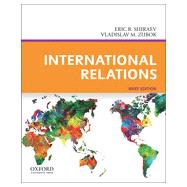What do we study in international relations? How do we study it? And how do we apply it?
Using these guiding questions as a framework, International Relations, Brief Edition, shows students how to think critically about issues in world politics. In each chapter, a brief opening case is followed by a description of key developments, an explanation of the main approaches to analyze them, and applications of those approaches in individual, state, and global contexts. The authors provide extensive historical information throughout, giving students a holistic frame of reference from which to understand current events.
FEATURES
* A consistent analytical framework organized around three questions guides students through the material
* A critical-thinking approach is introduced in Chapter 1 and reinforced throughout the text in opening vignettes, "Debate" boxes, "Case in Point" features, and "Visual Review" summaries
* Two chapters on key theoretical approaches introduce realism and liberalism (Ch. 2) and constructivism and other modern perspectives (Ch. 3)
* All chapters incorporate historical material throughout and end with an extended case study, "Past, Present, and Future," that applies learning objectives to classic and contemporary challenges
* The "How Do We Apply It?" section of each chapter examines issues within the individual, state, and global contexts of analysis
* Running "Check Your Knowledge" questions, a glossary of key terms, and bulleted chapter summaries help students assess what they've learned
* A unique conclusion, "Forecasting the World of 2025," serves as a capstone exercise, guiding students in evaluating issues and making predictions for the future
* An Instructor's Resource Manual, a Computerized Test Bank, CNN Videos, a Companion Website (www.oup.com/us/shiraev), and a Facebook page (www.facebook.com/InternationalRelationsTextbook) provide additional resources for instructors and students








